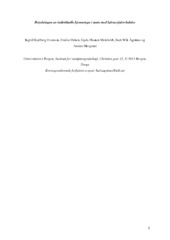Betydningen av individuelle kjennetegn i møte med laissez-faire-ledelse
Evensen, Ingrid Kjølberg; Orlien, Emilie; Motzfeldt, Gyda Flaaten; Ågotnes, Kari Wik; Skogstad, Anders
Peer reviewed, Journal article
Accepted version
Permanent lenke
https://hdl.handle.net/1956/22241Utgivelsesdato
2019Metadata
Vis full innførselSamlinger
Originalversjon
https://doi.org/10.15714/scandpsychol.6.e5Sammendrag
The aim of this study was to examine laissez-faire leadership as a predictor of role ambiguity in the workplace. It also endeavoured to uncover whether occupational self-efficacy and competence uncertainty moderated this relationship. In a sample of 386 Norwegian employees who were also students at Folkeuniversitetet, laissez-faire leadership showed a significant association with role ambiguity. Hierarchical multiple regression was used in the analysis of the possible moderating effects occupational self-efficacy and competence uncertainty had on this relationship. We found a significant interaction effect of occupational self-efficacy on the relationship between laissez-faire leadership and role ambiguity. Specifically, the positive relationship between laissez-faire leadership and role ambiguity proved stronger at low levels of occupational self-efficacy. Contrary to our predictions, the analysis showed no significant interaction effect of competence uncertainty on the same relationship. Demonstrating that the relationship between laissez-faire leadership and role ambiguity can be moderated by individual characteristics asserts the need for further research on how organisations can establish measures to strengthen employees’ personal resources, in addition to preventing the occurrence of laissez-faire leadership.
